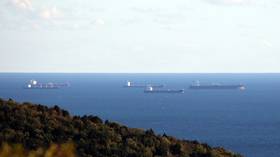Morocco supplies Spain with Russian diesel – El Mundo
The North African country has boosted imports of the fuel, which has been shunned by the West
Morocco is purchasing Russian diesel and other refined products at discounted prices and re-exporting the fuel to Spain, El Mundo reported on Friday, citing ship tracking sources.
Data from navigation tracking portal Vesselfinder showed that, on April 28, at least three tankers were heading from Russia’s Baltic ports to Morocco carrying approximately 170,000 tons of oil products on board.
The North African country, which bought about 600,000 barrels of Russian diesel throughout 2021, ramped up imports of the product to 2 million barrels in January 2023, with another 1.2 million barrels arriving in the country in February, according to tracking sources.
Morocco’s fuel exports almost stopped after its only processing plant was shut down in 2015 over unpaid taxes and legal hurdles, leaving the country dependent on refined oil imports.
In the beginning of the year, Rabat resumed fuel supplies and expanded exports of diesel from its Horizon Tanger terminal to Spain, Türkiye, Ghana, and southern Africa, the outlet said. In January, the country sent 280,000 barrels of diesel to the Spanish Canary Islands and another 270,000 barrels to Türkiye.
“At the end of 2022, Morocco began to buy diesel fuel from Moscow at an average of more than 7 million liters per day. In parallel, Rabat began to export it to Spain,” the outlet wrote.
According to ship tracking data, Moroccan deliveries now account for 10% of monthly Spanish demand for diesel, estimated at $60 million. According to some media reports, in March, Morocco, Tunisia, and Algeria accounted for 30% of Russia’s diesel exports.
Meanwhile, the Spanish government has pledged to ensure that no Russian fuel enters the kingdom.
“Our obligation is to investigate what happens with the fuel [supplies],” Spanish Deputy Prime Minister Teresa Ribera told reporters on Friday. “Initially, it comes with documents confirming its appropriate origin,” she added.
Russia has been diversifying its energy supplies in response to Western sanctions after the EU stopped accepting the country’s oil transported by sea. In December, the EU, G7, and allied countries imposed an embargo and a $60-per-barrel price cap on Russian crude. Similar restrictions were introduced in February for exports of petroleum products.
For more stories on economy & finance visit RT’s business section






Comments are closed.